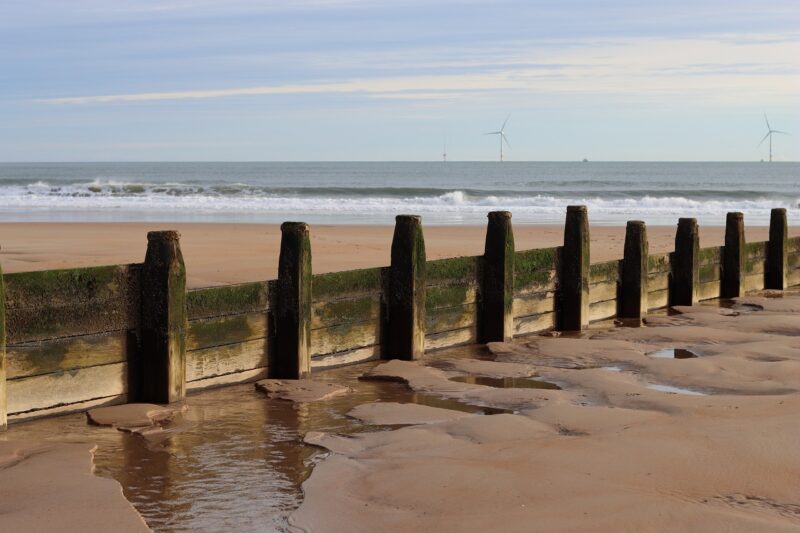Published: 06/08/25 By: Mike Bekin
Timber beach groynes are a must-have for coastal protection. Visit any beach along the UK coast and you will likely spot these chunky, timber pillars poking out of the sand and stones. They are used for preventing too much movement of the pebbles, preventing erosion and creating wider, more stable beaches. But what timber species are frequently used for UK groynes? Let’s take a look.
Choosing Hardwoods for Beach Groynes
When exploring your options for sea groynes, beach-suitable timbers are a must. These should be durable with a high resistance to rot and marine insects. The timber must be able to endure long periods of submersion in saltwater without deteriorating, which means it should have a low permeability to water and a tight grain structure.
Another must? A dense timber species. This will give it the strength it needs to withstand the impact of the tides and shifting sediment. You will also need great dimensional stability, stopping your sea groynes from swelling and warping over time.
A Quick Note on Durability and Use Class
Durability and use classes are there to help you choose a suitable timber species for your beach groynes to last for decades. If you are not dealing with budget constraints, we would recommend a timber which has a durability class 1 and a use class 5. These will be the species with the highest level of endurance, and are suitable for constant contact with the ground.
Suitable Timber Species for Groyne Installations
Despite having quite a few essentials on the checklist, beach groynes can actually be constructed from a variety of hardwood timber species. Some of our favourite choices include:
Greenheart
Durability class 1.
A tropical hardwood native to South America, Greenheart is exceptionally dense and durable, with a natural resistance to marine borers, rot and fungi. Its high strength-to-weight ratio and excellent performance in saltwater environments make it one of the most trusted timbers for marine applications. Greenheart can last decades with minimal maintenance, even under constant tidal pressure.
Ekki
Durability class 1.
Also known as Azobe, Ekki is an extremely hard and heavy West African hardwood, prized for its superior resistance to rot and insect attack. It is super strong, has great dimensional stability and can withstand seawater without a hitch, making it the perfect choice for long-term sea groynes.
Oak
Durability class 2.
Oak, while not as naturally durable as the tropical hardwoods we have listed, is still a popular choice for beach groynes when treated properly. It offers good structural strength and can be pressure-treated to improve its resistance to decay and marine organisms. It is also native to the UK, making it a great choice for blending with the natural British landscape.
Find a Timber for Beach Groynes
The lifespan of timber groynes depends entirely on the timber species you choose. Ekki, Greenheart and Oak are all excellent choices for durable, long-lasting beach groynes, and we can help you source these timbers sustainably. For FSC or PEFC-certified timber for your sea groynes, reach out to us today.
Tags: coastal defence, Groynes, Hardwood
Categories: Insights
